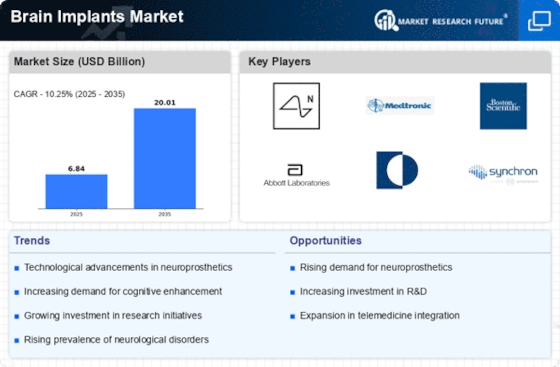Market Analysis
In-depth Analysis of Brain Implants Market Industry Landscape
Epilepsy is a group of disorders marked by recurring seizures or disruptions in the brain's electrical activity. It can affect people of all ages, from infants to the elderly, and may stem from various causes, including genetic factors, illness, head injuries, or abnormal brain development. The National Institute of Neurological Disorders and Stroke plays a crucial role in funding research aimed at finding cures for epilepsy and preventing seizures in individuals at risk.
In 2018, an estimated USD 152 million was allocated for epilepsy research by the National Institute of Neurological Disorders and Stroke. This funding reflects the urgency to address the impact of epilepsy, which can lead to disability, a diminished quality of life, and an increased risk of sudden death. Discovering new therapeutic drugs and surgical interventions is essential for effectively treating epilepsy.
The American Epilepsy Society (AES) actively participates in recognizing International Epilepsy Day, joining professionals worldwide in advocating for increased investment in epilepsy research. The World Health Organization also emphasized the need for more research in January 2015. Currently, there are no therapies available to reduce the development of epilepsy in individuals at risk due to brain injuries from trauma, stroke, or other causes. Furthermore, there are no treatments to prevent Sudden Unexpected Death in Epilepsy (SUDEP) or address the cognitive co-morbidities that negatively impact the quality of life for more than one-third of Americans with epilepsy.
Given these gaps in available treatments, research efforts are crucial to discovering new options and gaining a better understanding of the underlying causes of epilepsy. Despite these challenges, the global community of epilepsy researchers is expanding, leading to ongoing discoveries. The AES, in particular, stands out as one of the largest non-governmental funders supporting early-career researchers in epilepsy. An impressive 85% of their grants budget is dedicated to nurturing the next generation of epilepsy researchers.
In conclusion, epilepsy poses significant challenges for individuals across all age groups, necessitating a comprehensive approach to research and treatment. The efforts of organizations like the National Institute of Neurological Disorders and Stroke and the American Epilepsy Society are pivotal in advancing our understanding of epilepsy, developing effective treatments, and ultimately improving the lives of those affected by this neurological disorder. Continued investment in research is vital to addressing the unmet needs in epilepsy care and ensuring a brighter future for individuals living with this condition.


















Leave a Comment